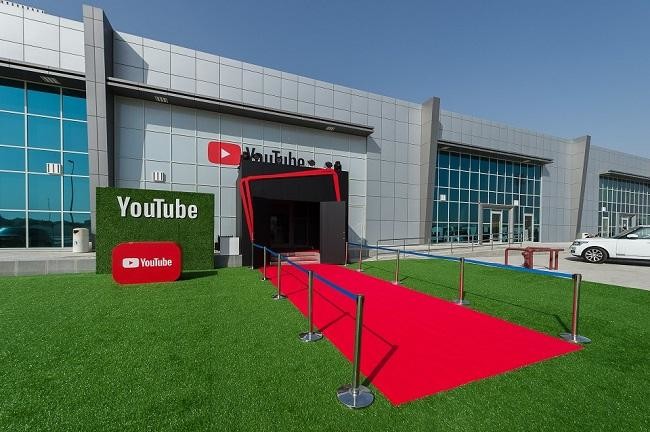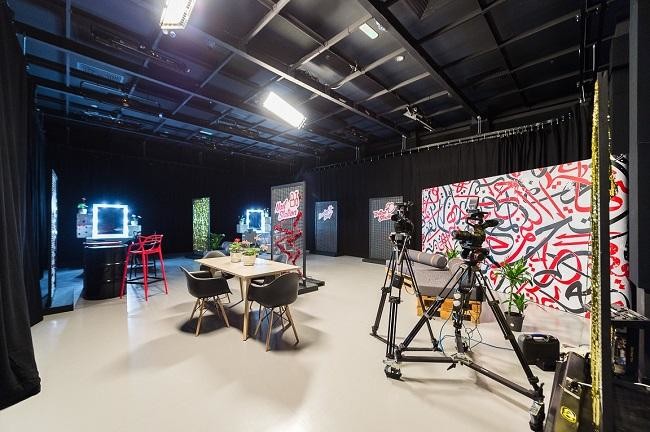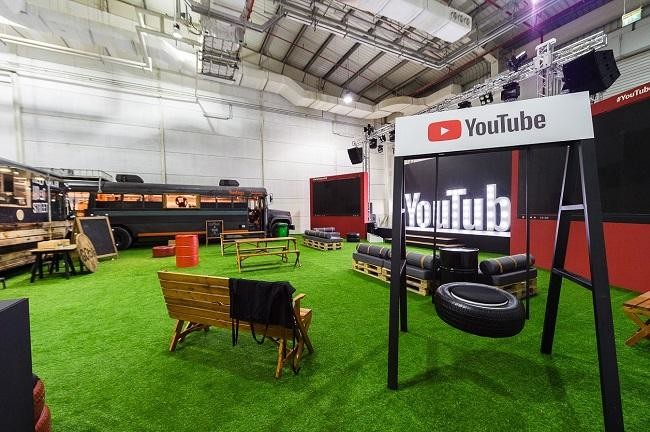DUBAI: Deep in Dubai’s desert dunes on the outskirts of the vast sprawling city, inside an unassuming, warehouse-like building, the world’s largest video-sharing website has created a high-tech, state-of-the-art space that it says will cater to the Arab world’s biggest and brightest vloggers.
After walking along a red carpet lined by bright, green plastic grass — and a surprisingly small reception area – you finally enter YouTube’s first-ever Middle East and North African “Space.”
Completely free of charge, this whole space – with everything in it — is allocated to YouTube creators with a following of 10,000 or more, while those with more than 1,000 subscribers are offered access to workshops and events.
You are greeted by a floor to ceiling abstract mural of Arabian stallions, camels and shisha-smoking patrons in a community area scattered with black and red barrel tables and an assortment of seating paraphernalia facing a permanently-installed video wall – the furnishings, we are told, are there just for the launch.
A window offers a glimpse from the community room into a 60 square meter studio, that caters for small productions — but offers a high-end, multi-camera set-up. Separated by a common wall, is a bigger 120 square meter studio for the bigger and more complicated productions, fully equipped with green-screen curtains and direct connection to a control room that sits above the whole space.
While creators can bring their own equipment, they need not worry as the most state-of-the-art and high-tech cameras, microphones and lights are available in the “Tech Cage” which nestles in the corner of the community area.
“In order to take it to the next level, as a YouTuber, you need a space to be able to work from, you’d need studios, cameras, equipment which is what this space is offering,” Bahraini YouTube sensation Omar Farooq told Arab News.
“The space allows you to go from an amateur YouTuber to one that’s professional and fully dependent on it for earnings,” Farooq, who has over 1.3 million subscribers, added.
YouTube creators have increased in the Arab world by 160 percent over the past three years, according to the company’s own statistics. Today, more than 200 channels with more than 1 million subscribers are spread across the MENA region, and in excess of 30,000 channels have more than 10,000 subscribers.
Speaking at the press launch of the facility, Head of YouTube Spaces in EMEA David Ripert said the Dubai Space is: “to be a hub where creators don’t just continue to make the videos millions of people have grown to love, but to also experiment with new formats and ideas made possible by the Space’s production facilities.”
The Dubai space is the company’s tenth worldwide, with other locations including Berlin, Toronto, Los Angeles, Mumbai, New York, Tokyo, Sau Paolo, Paris, and London.
YouTube launches Arab world’s first creative content creation space
YouTube launches Arab world’s first creative content creation space

Al-Qaeda has executed Yemeni journalist abducted 9 years ago, says media watchdog

- Mohamed Al-Maqri disappeared in the Arabian Peninsula while covering an anti-group protest in Al-Mukalla
LONDON: Al-Qaeda in the Arabian Peninsula has executed Yemeni journalist Mohamed Al-Maqri after holding him captive for nine years, the Committee to Protect Journalists reported on Thursday.
Al-Maqri, a correspondent for the television channel Yemen Today, was abducted in 2015 while covering an anti-AQAP protest in Al-Mukalla, the capital of the southern governorate of Hadhramaut.
He was executed along with 10 other individuals after years of enforced disappearance.
“The killing of Mohamed Al-Maqri highlights the extreme dangers Yemeni journalists face while reporting from one of the world’s perilous conflict zones,” said Yeganeh Rezaian, CPJ’s interim MENA (Middle East and North Africa) program coordinator.
“Enforced disappearances continue to endanger their lives.”
Rezaian condemned the act and called for accountability, urging all factions in Yemen to abandon such “abhorrent practices.”
The Yemeni Journalists Syndicate also condemned the execution, saying it was working with “the relevant authorities to investigate the crime, prosecute the perpetrators, recover the journalist’s body, and deliver it to his family.”
Al-Maqri had been held incommunicado by AQAP since Oct. 12, 2015, following his abduction during the protest.
The group accused the individuals of “spying against the mujahedeen,” a label the group uses for its fighters.
His death underscores the increasing dangers for journalists operating in Yemen, where armed groups have targeted media professionals as part of broader efforts to suppress dissent and control narratives.
At least two other Yemeni journalists remain subjected to enforced disappearances, a practice characterized by abduction and the refusal to disclose a person’s fate or whereabouts.
Waheed Al-Sufi, the editor-in-chief of the independent newspaper Al-Arabiya, has been missing since April 2015 and is thought to be being held by the Houthi movement.
Naseh Shaker, who was last heard from on Nov. 19, 2024, is believed to be being held by the Southern Transitional Council, a secessionist organization in southern Yemen.
Yemen continues to rank among the deadliest countries for journalists, with armed conflict and factional violence leaving media workers vulnerable to abductions, disappearances, and killings.
Apple agrees to $95 million deal to settle Siri eavesdropping suit

- A class action lawsuit filed five years ago accused Siri of listening in on private conversations of people with iPhones, iPads, HomePods or other Apple devices enhanced with the digital assistant
SAN FRANCISCO, California: Apple has agreed to pay $95 million to settle a lawsuit accusing its digital assistant Siri of listening in on users’ private conversations.
The proposed settlement detailed in a court filing accessed on Thursday came with Apple holding firm that it did nothing wrong.
“Apple has at all times denied and continues to deny any and all alleged wrongdoing and liability,” the tech titan said in the proposed settlement, which requires a judge’s approval to be finalized.
A class action lawsuit filed five years ago accused Siri of listening in on private conversations of people with iPhones, iPads, HomePods or other Apple devices enhanced with the digital assistant.
The California-based tech giant has made user privacy a big part of its brand image, and one of the reasons it tightly controls its “ecosystem” of hardware and software.
Talk captured by “unintended Siri activation” were obtained by Apple and perhaps even shared with third parties, according to the suit.
A proposed settlement fund of $95 million would be used to pay no more than $20 per Siri device to US owners who had private conversations captured without permission, the settlement indicated.
The agreement also requires Apple to confirm it has deleted any overheard talk and make user choices clear when it comes to voice data gathered to improve Siri.
Apple did not immediately respond to a request for comment.
In 2023, Amazon agreed to pay more than $30 million to the US Federal Trade Commission to settle litigation accusing the company of violating privacy with its Ring doorbell cameras and Alexa digital assistant.
Blowback online to Jewish Chronicle article claiming Palestinian solidarity is antisemitic

- Newspaper faces criticism after writer Melanie Phillips suggests advocating for Palestinian rights fosters ‘deranged and murderous Jew-hatred’
- One social media user wrote: ‘Your exploitation of antisemitism is seriously disturbing. But why would Zionists care that they endanger Jews by merging their identity with Israel?’
LONDON: British newspaper The Jewish Chronicle is facing intense criticism over an article in which the writer equated support for the Palestinian cause with antisemitism.
The piece was written by British commentator Melanie Phillips and published on Tuesday with the headline “If you support the Palestinian cause in any form, you’re facilitating Jew-hate.” It was subsequently edited and the headline changed to “The Truth of the Palestinian cause,” without any editorial note of the changes.
In her article, Phillips suggested that advocating for Palestinian rights fosters “deranged and murderous Jew-hatred.”
She wrote: “Jew-hatred has not only been normalized. It’s been rebranded as social justice because support for Palestinianism, which seeks to write the Jews out of their country, their history and the world, is what now passes for a moral sense among swathes of the public, the entire intelligentsia and even — heaven help us — many Jews.”
Phillips continues: “Let’s not hear any protests that you were once a member of Habonim or have a holiday home in Herzliya … If you support the Palestinian Arab cause today, you are facilitating deranged and murderous Jew-hatred. Own it.”
The article was widely condemned on social media.
The user Torah Jews wrote in a message posted on X: “Your exploitation of antisemitism is seriously disturbing. But why would Zionists care that they endanger Jews by merging their identity with Israel?”
Miqdaad Versi, a spokesperson for the Muslim Council of Britain, wrote that even after the “secret” edits to the article, Phillips’ words “remain disgusting.” He added: “Always good to see the cranks at The Jewish Chronicle show their true colours.”
Some critics accused the newspaper of promoting “Israeli propaganda.” Others warned that such rhetoric undermines efforts to combat true antisemitism by conflating it with solidarity for the Palestinian people.
Political commentator Owen Jones said: “Melanie Phillips is explicitly stating what Israel’s cheerleaders have long been pushing for. They want to redefine antisemitism as ‘any form of solidarity with Palestinians,’ rather than the very dangerous hatred of Jewish people that it is.”
This is not the first time the writer and the newspaper have caused controversy. Phillips has long argued that solidarity with Palestinians should be considered antisemitic, and she has denied the existence of Islamophobia.
In September, The Jewish Chronicle was criticized after it emerged that one of its writers had fabricated details in several high-profile stories. The revelations prompted a mass exodus of staff, with departing employees complaining of poor editorial standards under the present management.
Malaysia grants WeChat, TikTok licenses to operate under new law

- Telegram and Meta are pursuing licenses, while X and Google have yet to apply, officials confirm
- The licensing requirement stems from new legislation targeting the surge in cybercrime
KUALA LUMPUR: Malaysia’s communications regulator said it granted Tencent’s WeChat and ByteDance’s TikTok licenses to operate in the country under a new social media law, but that some other platforms had not applied.
The law, aimed at tackling rising cybercrime, requires social media platforms and messaging services with more than 8 million users in Malaysia to obtain a license or face legal action. It came into effect on Jan. 1.
In a statement on Wednesday, the Malaysian Communications and Multimedia Commission said messaging platform Telegram was in the final stages of obtaining its license, while Meta Platforms, which owns Facebook, Instagram and WhatsApp, had begun the licensing process.
The regulator said X had not submitted an application because the platform said its local user base did not reach the 8 million threshold. The regulator said it was reviewing the validity of X’s claim.
Alphabet’s Google, which operates video platform YouTube, had also not applied for a license after raising concerns about the video sharing features of YouTube and its classification under the licensing law, the regulator said. It did not state the concerns or how they relate to the law but said YouTube must adhere.
“Platform providers found to be in violation of licensing requirements may be subject to investigation and regulatory actions,” the regulator said.
Malaysia reported a sharp increase in harmful social media content in early 2024 and urged social media firms, including Meta and short video platform TikTok, to step up monitoring of their platforms.
Malaysian authorities deem online gambling, scams, child pornography and grooming, cyberbullying and content related to race, religion and royalty as harmful.
The companies do not publish the number of users per country on their platforms.
According to independent data provider World Population Review, WeChat has 12 million users in Malaysia.
Advisory firm Kepios said YouTube had about 24.1 million users in Malaysia in early 2024, TikTok 28.68 million users aged 18 and above, Facebook 22.35 million users, and X had 5.71 million.
Palestinian Authority suspends broadcast of Qatar’s Al-Jazeera TV temporarily

- Committee suspends the broadcaster’s operations over the broadcast of “inciting material"
CAIRO: The Palestinian Authority suspended the broadcast of Qatar’s Al-Jazeera TV temporarily over “inciting material,” Palestinian official news agency WAFA reported on Wednesday.
A ministerial committee that includes the culture, interior and communications ministries decided to suspend the broadcaster’s operations over what they described as broadcasting “inciting material and reports that were deceiving and stirring strife” in the country.
The decision isn’t expected to be implemented in Hamas-run Gaza where the Palestinian Authority does not exercise power.
Al-Jazeera TV last week came under criticism by the Palestinian Authority over its coverage of the weeks-long standoff between Palestinian security forces and militant fighters in the Jenin camp in the occupied West Bank.
Fatah, the faction which controls the Palestinian Authority, said the broadcaster was sowing division in “our Arab homeland in general and in Palestine in particular.” It encouraged Palestinians not to cooperate with the network.
Israeli forces in September issued Al-Jazeera with a military order to shut down operations, after they raided the outlet’s bureau in the West Bank city of Ramallah.
Media rights groups have called on the Palestinian Authority to reverse its decision, denouncing the move as an attack on press freedom.
“Governments resort to censoring news outlets when they have something to hide,” said Committee to Protect Journalists CEO Jodie Ginsberg.
“The Palestinian Authority should reverse its decision to suspend Al Jazeera’s operations and allow journalists to report freely without fear of reprisal.”


























